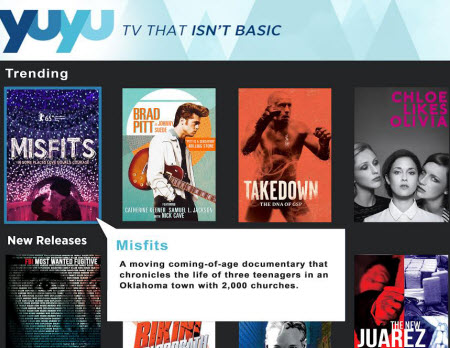Filling the Gaps in OTT Content
The smarter way to stay on top of the multichannel video marketplace. Sign up below.
You are now subscribed
Your newsletter sign-up was successful

Digital Media Rights has more than 8,000 TV shows and movies under license, and it’s moving ahead with an ambitious plan to put them all to good use amid the rise of over-the-top video consumption.
DMR, which already distributes some of its fare through digital deals with Amazon Prime, Hulu and Netflix, has plans to launch six subscription-based over-the-top services before year-end.
Following the earlier debuts of two of those services — Midnight Pulp (horror and thriller titles, relaunched in February) and Asian Crush (pan-Asian content, relaunched in April) — DMR has hit go on Yuyu, a general-entertainment service offering content in more than a dozen categories and genres, including “Binge Worthy” television, “Stranger Than Fiction” documentaries and “Tour de Force Performance.”
DMR hasn’t announced the other three SVOD services that are in the works, but its current offerings each cost $4.99 per month. Its latest, Yuyu, is launching with more than 350 titles, including Johnny Suede with Brad Pitt, 95 Miles to Go with Ray Romano, crime documentary Where Is Robert Fisher? and Misfits, a story about LGBT teens in the heart of the Bible Belt.
Yuyu was available at launch via Roku players and Roku TVs, mobile devices and Web browsers, with development underway for Apple TV, Amazon Fire TV, Sony smart TVs and Google Chromecast.
As suggested in its tagline, “TV That Isn’t Basic,” Yuyu wants to offer content that fills the niche between traditional cable-network protgramming and the premium content available on YouTube.
“It’s a very exciting time for independent publishers,” DMR CEO Michael Hong said. “We kind of want to bridge the gap.”
The smarter way to stay on top of the multichannel video marketplace. Sign up below.
Offering curated independent content puts Yuyu on a level playing field on platforms like Roku while also “competing quite nicely and, in some cases, beating some of the cable channels that are out there,” he added. “That’s what we love about this new kind of paradigm.”
Because Yuyu is digital, it can put forth a multitude of formats, including feature-length films, sitcoms, dramas and documentaries. “We’re not about [filling] programming gaps that are obscure or marginal,” he said. “We’re talking about huge, impactful genres that the traditional networks are totally missing the boat on.”
Hong called digital and TV content producer Vice Media an “inspiration” for Yuyu, because it has been successful at identifying key genres that have tremendous value for consumers. “We’re trying to tap into that.”
Though DMR distributes content on Amazon and Hulu, which are like video “department stores,” the plan is to create “unique boutique” OTT services, Hong said, noting the company will also augment its SVOD offerings with exclusive titles and early windows.
DMR has international rights for most of its content, Hong said. While the initial focus is on the U.S. and Canada, the company intends to later expand to other English-speaking territories.
Hong is also aware that the OTT SVOD market is getting crowded. Rather than just focusing on videos, he said DMR’s services will also look to capture the “culture” behind them.
“Over time, the goal is about engagement and building the community,” he said, noting forays into social media, for example. At last check, Asian Crush had 76,298 “likes” on Facebook, while Midnight Pulp has about 26,206.
“That’s really fulfilling the potential of digital,” Hong said of those community-building aspects. “We don’t want to just be a total lean-back experience that you find with cable.”
For now DMR, a private company established in 2010, will market its SVOD services on its own rather than strike deals with streaming aggregation services such as Amazon’s new Streaming Partners Program or VRV, a service launching later this year from Ellation.
DMR is already making good money by distributing content on Amazon Prime, Hong said.
“Those [SVOD aggregation] services, I think, work best for companies that have been around for a while. You can kind of get lost in the shuffle, if you’re a new company,” Hong said, allowing that “eventually it might make sense to be on those platforms.”
